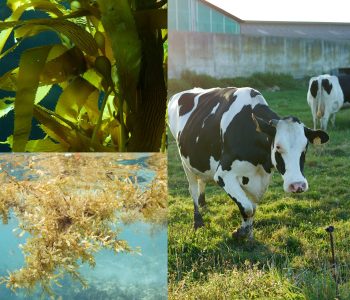Study Shows Dairy Farmers Open to Methane-Reducing Seaweed Feed
New England’s Dairy Industry Adapts to Market Challenges
In response to significant market challenges such as decreased milk demand and rising production and land costs, New England’s dairy industry is evolving. Organic dairy farming is showing potential environmental benefits, including reducing methane emissions, which could help differentiate products and qualify farms for new government initiatives aimed at methane reduction through innovative management practices.
Farmers Open to Investing in Methane Reduction
Researchers from the University of New Hampshire, in collaboration with researchers in Maine, have found that nearly half of organic dairy farmers are willing to pay extra for methane-reducing seaweed feed. However, this willingness depends on the feed being cost-effective, aligning with existing feeding practices, and qualifying for government subsidies.
“Dairy farmers aim to run their farms as lucrative enterprises,” said Andre Brito, associate professor of dairy cattle nutrition and management at UNH’s New Hampshire Agricultural Experiment Station. “The additional cost would require serious considerations, as well as more data and an effective implementation of carbon markets in the future.”
Study Results: Survey and Feeding Trial
Published in Frontiers in Veterinary Science, the study surveyed 35 Maine organic dairy farmers. All participants were familiar with seaweed-based feeds, and about one-third were already using them. Nearly half expressed willingness to pay an additional 64 cents per cow per day for methane-reducing seaweed feed.
The researchers also conducted a feeding trial at Maine’s Wolfe’s Neck Center for Agriculture & the Environment, where 22 cows were fed a diet containing 6% red seaweed (C. crispus) from February to May. This diet, sourced locally from the Maine coastline, reduced methane production by 13.9% without affecting milk production and quality.
“Maine is the birthplace of temperate seaweed farming in the United States and supports organic certification of seaweeds,” said Nichole Price, senior research scientist at the Bigelow Laboratory for Ocean Sciences. “The proximity of the nascent seaweed industry to organic dairy farms makes Maine the perfect testbed for this exciting inquiry.”
Broader Farmer Concerns
The survey revealed that 93% of farmers were more concerned about issues such as labor shortages, infrastructure problems, rising costs, and unstable supply chains than climate change and regulation. Farmers would consider using seaweed in their cows’ diets only if it is cost-effective, aligns with existing practices, and receives government support.
Funding and Collaboration
The study was funded by the USDA National Institute of Food and Agriculture and the N.H. Agricultural Experiment Station. Co-authors included Diana Reyes (UNH), Jennifer Meredith (Colby College), Leah Puro (Wolfe’s Neck Center for Agriculture and the Environment), Katherine Berry (Wolfe’s Neck Center), Richard Kersbergen (University of Maine Cooperative Extension), Kathy Soder (USDA), Charlotte Quigley (Bigelow Laboratory), Michael Donihue (Colby College), and Dorn Cox (Wolfe’s Neck Center).
NH Agricultural Experiment Station: A Legacy of Research
Founded in 1887, the NH Agricultural Experiment Station at the UNH College of Life Sciences and Agriculture is UNH’s first research center. It stewards federal and state funding to provide unbiased research on sustainable agriculture, foods, aquaculture, forest management, and related topics. Facilities include the Woodman and Kingman agronomy and horticultural research farms, Macfarlane Research Greenhouses, Fairchild Dairy Teaching and Research Center, and Organic Dairy Research Farm.
Source: “Research Finds Dairy Farmers Receptive to Methane-Reducing Seaweed Feed”
